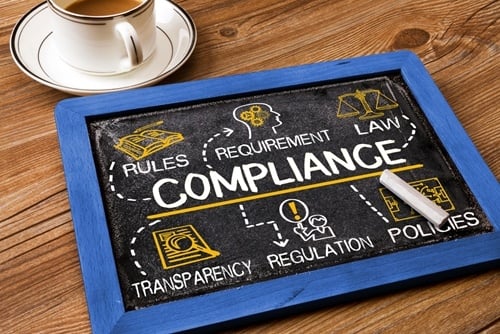An Update to Compliance Regulations. We've got you Covered
As you may be aware, in recent years an increasing number of class action lawsuits have been filed...

If you've looked in the news recently, you've no doubt heard a lot about major companies whose practices weren't compliant with employment laws. Discrimination, sexual harassment and similar issues plague these organizations, and more allegations seem to crop up every week. This points to a disturbing trend: Businesses or the employees within don't understand how refusing to comply with the law can come back to bite them. Unfortunately, this oversight has severe consequences. Not only can a compliance issue result in a lot of bad press, but it opens businesses up to lawsuits from employees, consumers and the state.
To nip these problems in the bud, human resource departments must impart the importance of ethics and compliance to all employees, from the C-suite on down.
While only some companies are legally required to have a code of conduct, it's best practice for every business to create one. These codes reinforce a company's values and objectives, according to the Ethics and Compliance Initiative, outlining proper behavior so the business can succeed. They ensure consistency and help staff members understand exactly what the business's principles are.
Your code of conduct must be compliant with laws established by the U.S. Equal Employment Opportunity Commission. Additionally, it should support any legal business-related values not outlined by the EEOC or other government agencies. Use the code to address topics like hiring and advancement best practices, conflicts of interest, harassment and health and safety.
From a legal perspective, what is and isn't permitted in the workplace can change at a moment's notice. It's important for HR departments to be on top of these developments - acknowledging them late doesn't absolve the company of observing them.
"Tracking legal changes requires a lot of resources."
Of course, tracking each and every legal change requires a lot of resources, especially for businesses that operate in more than one state. Outsourcing this step to a third party ensures compliance while relieving internal burdens.
Explaining the ins and outs of employment law is a great start, but it doesn't ensure employees remember what you said. It also doesn't help them navigate the tricky ethical questions that crop up in the middle of the workweek. Will this decision get the company sued? Was that comment technically illegal?
To help employees navigate such ambiguity, HR departments must provide a dedicated resource such as a handbook or staff expert. They need to know they can go to help them make appropriate, ethical decisions. In addition, they should hold ethics training sessions and discuss this trait during employee evaluations, noted the Society for Human Resource Management.
Just as employees should be able to count on HR for support, so too should they understand the consequences of noncompliance. Your staff needs to know that breaking the company ethics policy means they'll be penalized, no matter what their positions or levels of seniority. Letting employees get away with misconduct increases the risk of a lawsuit. What's more, it makes ethical employees uncomfortable, and they'll quickly seek a job elsewhere if a culture of noncompliance prevails.
If penalties are delivered inconsistently - two employees commit the same indiscretion but only one is disciplined - rule-abiding staff will grow bitter and disengaged, leading to low employment. They'll likely find a new job as well.
Compliance is important for legal purposes, but it also fosters a welcoming work environment that reduces turnover and allows employees to be productive. The concept should be a key value of any business, and HR departments should be strict and consistent when enforcing it.
Need a background check solution that ensures compliant hiring practices? Contact us by clicking on the button below.